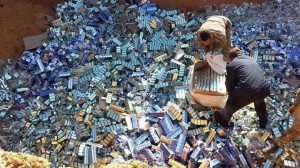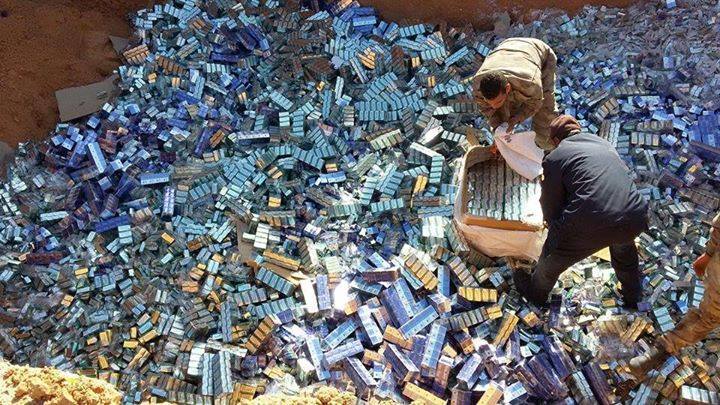By Libya Herald staff.

Malta, 18 January 2015:
Twenty million Tramadol pills were destroyed in Tripoli, the Salvation government of Tripoli reports.
The tablets . . .[restrict]- an opioid analgesic – have been described as hallucinogenic, although Tramadol is not known to have hallucinogenic properties. It is commonly prescribed as a painkiller and to treat a number of ailments, including rheumatoid arthritis and motor neuron disease. Tramadol is illegal in Libya.
The report says that Tripoli-based Drug Enforcement Agency destroyed the pills on Thursday at its Al-Jibs Gate site. The pills were seized last Thursday by Port and Customs authorities.
The quantity of pills was hidden behind 90 cartons of medical products inside a 40 foot container. The consignment originated in New Delhi and arrived in Tripoli via Alexandria. The shipment came to Libya by accident, the report said, as it was meant to arrive in the city of Benghazi.
Since the 2011 revolution there have been a number of reported seizures of pills and pharmaceuticals by the various authorities.
In September 2012, a shipment of over four million tramadol pills was seized at the Egyptian border as smugglers attempted to transport them into Egypt, and in October 2013, Tobruk Border Guards seized two million tablets being smuggled into Libya from Egypt.
Meanwhile, in May 2014, just over ten million Tramadol pills were seized in Misrata with an estimated street value of over LD 100 million, reportedly the largest ever drugs bust in Libya.
The increased seizure of drugs after the 2011 revolution is deemed to be as a result of the breakdown of Libya’s law and order institutions. This has led to drug traders targeting Libya by flooding it with cut price products.
In November 2013, the then head of the Supreme Security Committee (SSC), Hashim Bishr, had told Libya Herald that “Some kinds of tablets during the Qaddafi regime used to sell for LD 13 per tablet and now the same tablet is being sold for only LD 1”. Other drugs, he said, could be purchased for as little as a quarter of a dinar per tablet.
“Drugs are now coming across the border and through checkpoints without difficulty,” Bishr said. It has long been suspected that some security personnel are involved in smuggling drugs across Libya’s land borders – a suspicion that Bishr confirmed.
“As I have said before, Libya Shield, SSC cars and military police cars sometimes carry the drugs.” He added that these cars, bearing official badges passed easily through checkpoints: “Because no-one stops and checks them, it is easy to cross the borders without being searched.”
Drug-dealers seemed to now be targeting Libya, Bishr said. “There are some people who are just thinking about making money and others are really thinking to try and saturate the country with drugs.”
He added that some anti-drug experts had told him that some of the biggest drug dealers outside the country wanted to make Libya a base, from where they could re-export drugs to neighbouring countries.
“That’s why we now find drugs in Libya are cheaper than any other country. Cheaper even than the countries of origin,” Bishr said. “I am sure there are some people working to saturate the (Libyan) market with drugs.” [/restrict]








